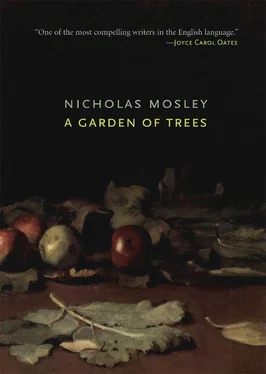“Yes,” I said.
“And the claims of love?”
“The claims,” I said, “yes.”
“Rubbish!” he said. We sped down Regent Street. “I don’t believe you for a minute.” I laughed again. “But I know that that is what Peter believes,” he said.
He pulled up near Piccadilly Circus. “Look here,” he said, “are you doing anything for half an hour?”
“No,” I said.
“Then would you like to have a drink at my club? It is only just across the road.”
“I should like it very much,” I said.
“Right,” he said. We swerved out from the pavement and a bus shrieked to a standstill. “You see how crafty I am. I have no appointment.” We dodged the cursing traffic. “Another intolerable deceit of the older generation. But then, of course, you did not have an appointment either.”
In the club there was a room like a railway station. We sat in ageless leather chairs. “It is true,” he said, “that this place is rather appalling. Is that why you despise us?”
“I don’t,” I said.
“That’s cheating.” He nodded as an old man passed him. “I gather you think us mad.” The old man came up to him and they whispered at each other fiercely. Their heads pecked strangely like puppet birds. When they had finished he said, “It is interesting talking to you. Peter won’t talk.”
“I don’t think you’re mad,” I said.
“That is because you are older than Peter, then. When you are older still you will realize why we act like we do. Not all of us, of course. But you will see that it is difficult to do any better.”
“Do you despise us then?”
“Oh no. I only look on you with slight alarm. It seems to me that you are obsessed with the Garden of Eden. You insist on trying to recreate it and at the same time insist on making the original mistakes. I do find that alarming. But despicable, no.”
“Can we help making the original mistake?”
“I don’t think you can. I think it goes inevitably with Gardens of Eden.”
“Then what should we do?”
“I think, since we are talking in these terms, that you should read your bible. Isn’t it something about getting it within you? You mustn’t despise the bible, you know, although it may strike you as peculiar.”
“It does,” I said.
“Yes, but still, you must translate it. It is, after all, not a text-book. You have to learn the language before you can understand what it means. The trouble with Peter is that he either translates it into someone else’s terms or else he despises it. He will not trouble to learn the language.”
“It is very difficult to have faith,” I said.
“Why yes, of course.”
“You agree then?”
“If you say so. If you don’t want it.”
“But that’s what Peter wants.”
“And he can’t get it. So that’s that.”
“He thinks that you want to have him psychoanalysed,” I said.
“Does he? That was a chance remark of his mother’s, which resulted in a slight misunderstanding. It is no good being psychoanalysed, either, unless one wants to be.”
There was a silence for a while. I began to imagine what he wanted. “In fact,” I said, “in order to get results, someone has to be as crafty as the devil.”
“As many people as possible,” he said.
“I don’t trust that,” I said. “Not unless the people are very sure of what they are doing.”
“There can be, so to speak, limited objectives. It can do no harm, I am sure, to act simply upon what of course must be a genuine regard.”
“A regard for Peter?”
“Yes. And I know for certain that he has a regard for you.”
“Has he?”
“Yes. And he is not lavish with his respect. There are few people, I feel, who can influence him.”
“There was. . ” I began.
“There was someone whom he respected? Yes, I believe there was, and now there is no longer. You will have noticed, perhaps, that that is part of the trouble.”
I had noticed. I remembered Marius in the square with Peter running beside him, a moonlight night with emotion gone wrong, Marius as Mephistopheles and Peter as Faust. It had been a holiday beneath the statue that we had none of us understood. And now there was retribution. “I had noticed that,” I said.
“You see,” he said, “there is something in this century that is inimical to children. Peter is still a child. We have talked about the chasm between generations, but it is really not that, it is simply a difference in ages. My generation were children once, at the beginning of the century, and it is interesting to remember us. We were mostly killed in the war. There was an obsession with death when I was young just as now there is an obsession with futility. Then it was active and now it is passive; that is the only difference. We all of us arrive at that age when destruction becomes a mania of the soul — the age when we cease against our will to be children.
“Have you ever read the letters of young men at the beginning of the first world war? They are extraordinary reading. I mean the young men who, like myself and Peter, were brought up with every material advantage. I do not speak for those whose childhood was a material struggle, for their problems were different. My generation, the generation of Edwardian children being brought up in Edwardian luxury, came to an age at which they wanted to die. They said so, in their letters. They were children, and they did not know how to grow up, so they went to war to absolve themselves from the responsibility. There they found what they wanted. They said so. The war was a release, a fulfillment of childish continuities. They lived as children and they died as children, and I think they were glad.”
“It was not the same in this war,” I said.
“No, but that was because this war was not a children’s business. One gets, as it were, wise to war’s futility. We did, of course, after a few months in the trenches. But you were older than we, you knew it all before, you could find no release in sacrifice because you knew that it was sacrifice for nothing. We did not. And now you are alive, but you still don’t know what to do about it. It is funny how there were fewer deaths in this war probably because there were fewer desires for it.”
“Yes,” I said.
“Peter, of course, is different. Peter had no war. He did not have the opportunity for sacrifice. But the situation is there. He has reached an age at which he requires an opportunity to fulfill himself, and he does not find it. He was an extraordinary child, and the memory of that does not help him. He was brought up in the old style, and life ran kindly for him. We spent much of our time in foreign countries, you know, where English children are, so to speak, at a premium. And then he was at school. He was very successful at school. And then he was fond of Annabelle. I think he was quite unusually fond of Annabelle. They never fought, or quarreled, as brothers and sisters do. They used to guard each other carefully like ancient maiden ladies. There were times, indeed, when their regard for each other almost worried me. They became quite solemn and detached in their affection.”
“Yes,” I said.
“Once, you see, the world was not inimical to children. Once there was continuity between the expectation of a child and the expectation of an adult. The pattern was set, and the child advanced in it smoothly. Now the pattern is broken and the grown-up child is lost. This is a direct result of the freedom which children nowadays are given. This freedom is not right unless the child can build something out of it.”
“No,” I said.
“So, you see, this is a time of testing. We have agreed that children should not translate things into their parents’ terms, and this I have endeavoured to put into practice. Now we have to see whether our theories are justified. For Peter it is a time when childhood ceases. The old life dies and the new life begins. He has to find his own translation. I think it is only right that we should help the death to be as comfortable as possible.”
Читать дальше












